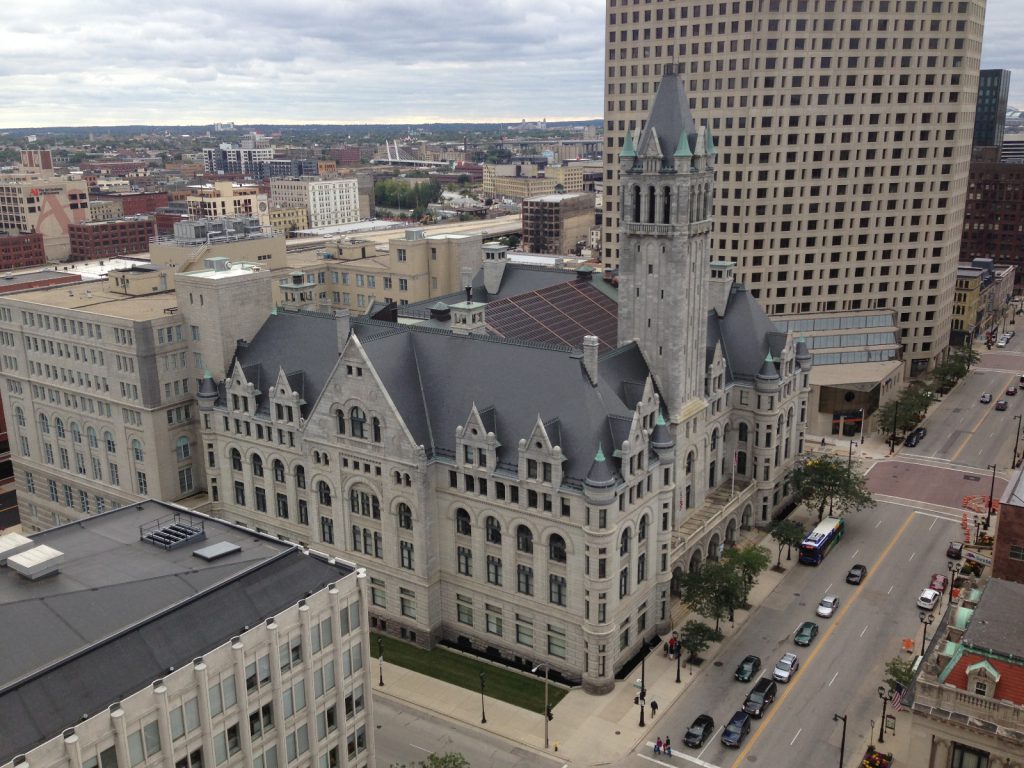Hannah Dugan Jurors Will Be Asked About Politics, News Sources
Case against Milwaukee judge has become partisan, politicized issue.

Milwaukee Federal Courthouse. Photo by Mariiana Tzotcheva
Potential jurors in Judge Hannah Dugan‘s criminal trial will be asked about their political views and where they get their news.
From the beginning, the federal criminal case against Dugan has been highly publicized, and politicized, and both the prosecution and the defense have asked the court to allow a questionnaire ahead of jury selection. However, they have not agreed on what exactly to ask jurors.
On Friday, U.S. District Judge Lynn Adelman decided to largely go with the questionnaire proposed by Dugan’s legal team, with some revisions of his own and the inclusion of some of the prosecution’s desired questions. It includes questions concerning political and social affiliations and media consumption.
Dugan was indicted in May on charges of allegedly obstructing a U.S. Immigration and Customs Enforcement (ICE) operation and concealing an individual from arrest on April 18 at the Milwaukee County Courthouse. Dugan allegedly told immigration agents to go speak to Chief Judge Carl Ashley after learning they were there to arrest an immigrant, according to the indictment. Agents were there to arrest Eduardo Flores-Ruiz, who was appearing in Dugan’s court on criminal charges. Afterward, the federal government alleges Dugan adjourned Flores-Ruiz’ case and sent him out of the court room through a door used by jurors. Federal agents arrested him outside of the courthouse.
The case is entangled in the national politics of President Donald Trump‘s immigration policies, including arresting immigrants at local courthouses and federal immigration courts. When Dugan was arrested FBI Director Kash Patel announced it on social media. U.S. Attorney General Pam Bondi similarly tweeted about the arrest, saying “No one is above the law.”
Dugan has maintained she is not guilty of the charges against her. She said her actions on April 18 all fell within the official duties of her office. She has even moved to have the charges against her dismissed, on the grounds that she is immune from criminal prosecution for official acts of her office. Adelman agreed with the argument from prosecutors that such an immunity does not appear to exist in federal law. Still, Adelman noted, Dugan raised questions about federal abuse of power and the separation of powers for which the prosecution could not provide a satisfying answer.
The case against Dugan goes to trial on Dec. 15. To speed up the jury selection process a questionnaire will be used to screen a large potential jury pool. It will include a number of anodyne questions about employment and education status. But it will also seek to probe political, and even cultural, affiliations, as well as news sources and opinions about law enforcement and the justice system.
“While a prospective juror’s political views, activities, or associations will usually be irrelevant, under the circumstances here it is appropriate to ask some questions about these issues to ensure a fair and impartial jury,” Adelman wrote.
The prosecution previously argued against asking about a jurors politics or where they get their news. Adelman did agree to get rid of one question that broadly asked: “How would you describe your political views?” But he kept in others related to political affiliations, as well as a question that asked potential jurors to list what sort of stickers, or patches of other signifiers they put on their personal property like cars, water bottle and laptops.
Adelman is also including questions from the prosecution the defense previously objected to. These questions outline the government’s allegations against Dugan and specifically name the parties involved, including associated attorneys and federal agents.
The defense has argued this could lead potential jurors to research the case and interested parties if they hadn’t already.
During initial discussions about the questionnaire, prosecutors stated they thought the court should describe the government’s allegations against Dugan and ask potential jurors how they were affected by pre-trial media coverage. But Adelman agreed with the government that it could help clear the jury pool of individuals who already have an opinion about the case. He also said the questionnaire would “instruct prospective jurors not to conduct research.”
Update: This story was updated to clarify that events described on April 18 are based on the government’s allegations against Dugan.
Legislation Link - Urban Milwaukee members see direct links to legislation mentioned in this article. Join today
If you think stories like this are important, become a member of Urban Milwaukee and help support real, independent journalism. Plus you get some cool added benefits.
MKE County
-
Fellow Judge Testifies in Dugan Case
 Dec 16th, 2025 by Graham Kilmer
Dec 16th, 2025 by Graham Kilmer
-
Key Questions in Dugan Trial Take Shape on First Day
 Dec 15th, 2025 by Graham Kilmer
Dec 15th, 2025 by Graham Kilmer
-
FTA Tells Milwaukee to Crack Down on Fare Evasion — Even Where Fares Don’t Exist
 Dec 12th, 2025 by Graham Kilmer
Dec 12th, 2025 by Graham Kilmer




















